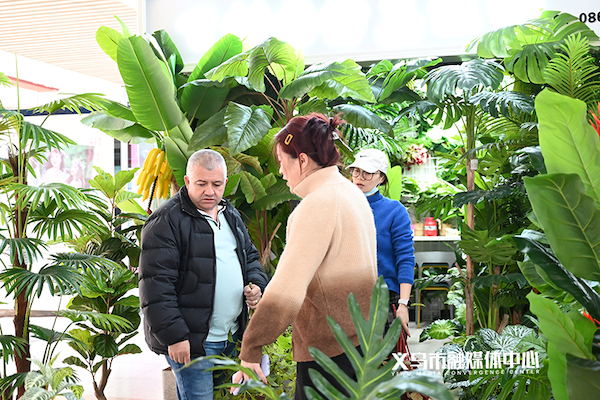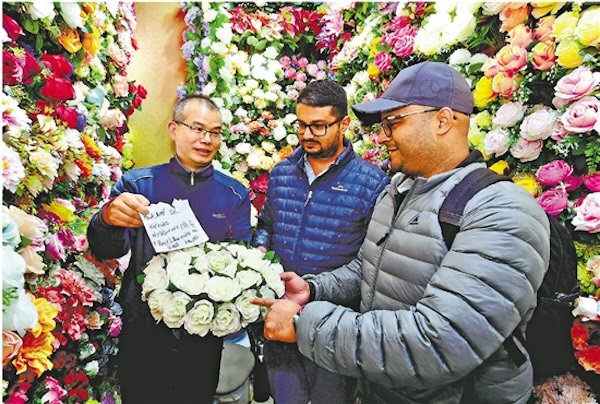Tourism to stoke holiday consumption

A tourist (right) joins a performer for a bamboo dance at the Nanshan Cultural Tourism Zone in Sanya, Hainan province, on April 14. [Photo by CHEN WENWU/FOR CHINA DAILY]
As brighter May beckons, customized travel products, premium services shine
With the spring blooming to its colorful glory amid balmy weather in the second half of April, up to 200 million wanderlust-bitten Chinese tourists, who had experienced lockdowns and social distancing over the past year, are expected to march out to a variety of domestic destinations during the five-day Labor Day holiday starting May 1.
They will ride the bounty of tailored travel products and premium services served by China's tourism industry amid expectations that the holiday could prove to be the hottest break ever for the domestic travel and hospitality markets since COVID-19, experts said.
With the COVID-19 pandemic increasingly brought under control in China and amid the country's move to stimulate domestic demand, tourism and hospitality industries are expected to be the biggest stokers of holiday consumption.
In the Chinese mainland, high-end hotel bookings accounted for more than 50 percent of total bookings for the holiday period, according to Trip Group, China's largest online travel agency.
Demand has been so intense that the Great 2021 Travel Rush caused a tsunami of online queries in the run-up to the holiday, resulting in crashing of servers hosting some online platforms peddling train tickets. In China, passengers can book train tickets online 15 days ahead of departure.
But similar spikes in queries and bookings were not uncommon at industry players offering travels, tours, air tickets, mobility solutions such as recreational vehicles (RVs), and accommodations like homestays and hotel rooms.
"This year, the domestic tourism industry will fully explore its resources to fuel spending and boost economic growth as international travel is yet to return to pre-pandemic levels," said Luo Xiang, an analyst at the LeadLeo Research Institute, a market research provider.
"Tourists are increasingly paying attention to the quality and experience of their trips. More operators should offer more high-quality, tailored products and premium services that cater to different groups of people."
China will continue to expand domestic demand, actively explore the growth potential of the domestic market, and encourage consumption in culture, travel and sports, said this year's Government Work Report delivered at the annual meeting of China's top legislature in March.
The high-quality development of the culture and tourism industries will also be a priority during the 14th Five-Year Plan period (2021-25).
Hotel room bookings for this year's Labor Day holiday surged more than 11 times on a yearly basis. The growth rate of bookings for long-haul, cross-province trips has surpassed that of trips to neighborhood areas for the first time since the pandemic, according to Fliggy, Alibaba's online travel arm.
"The domestic travel market is set to rebound to the level seen before the COVID-19 pandemic, and it can even exceed the pre-pandemic levels," said Gu Huimin, head of the School of Tourism Sciences at Beijing International Studies University.
The average price of a Labor Day holiday trip this year rose nearly 30 percent compared to the corresponding period of 2020. Specifically, the average price of flight tickets climbed more than 20 percent over the pre-pandemic level, Fliggy found.
Some economy-class flight tickets for journeys originating in Beijing for Sanya, Hainan province, on April 30 and May 1 have been sold out well in advance, and only business-class seats were still available two weeks before the holiday.
The scene is not very different for other domestic routes. Most flight tickets have been taken with only a few full-price economy-class seats still available, according to Qunar, a Beijing-based online travel agency.

 Yiwu and Qingtian: Global supermarket alliance spurs economic growth
Yiwu and Qingtian: Global supermarket alliance spurs economic growth Artificial flowers: Yiwu's evergreen business
Artificial flowers: Yiwu's evergreen business Yiwu Intl Trade Market reopens after Spring Festival holiday
Yiwu Intl Trade Market reopens after Spring Festival holiday